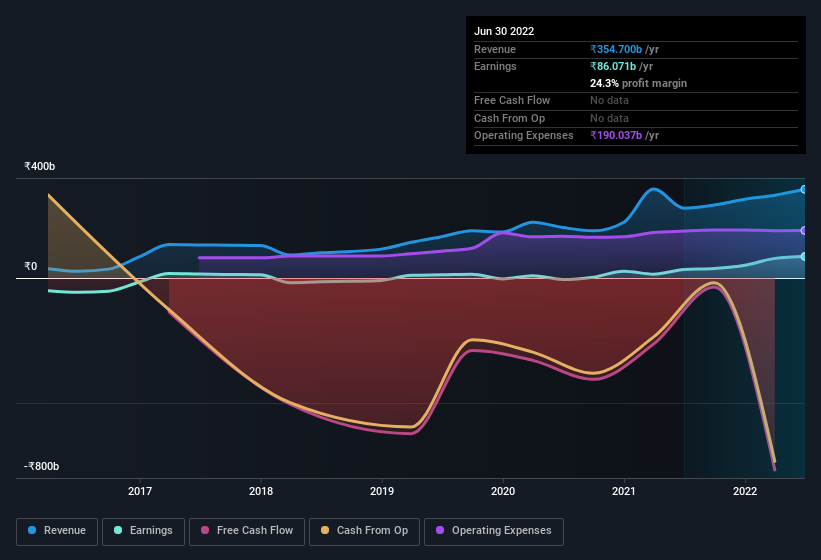Is Now The Time To Put Bank of Baroda (NSE:BANKBARODA) On Your Watchlist?

Investors are often guided by the idea of discovering 'the next big thing', even if that means buying 'story stocks' without any revenue, let alone profit. Sometimes these stories can cloud the minds of investors, leading them to invest with their emotions rather than on the merit of good company fundamentals. Loss making companies can act like a sponge for capital - so investors should be cautious that they're not throwing good money after bad.
In contrast to all that, many investors prefer to focus on companies like Bank of Baroda (NSE:BANKBARODA), which has not only revenues, but also profits. Even if this company is fairly valued by the market, investors would agree that generating consistent profits will continue to provide Bank of Baroda with the means to add long-term value to shareholders.
Check out our latest analysis for Bank of Baroda
How Fast Is Bank of Baroda Growing?
Generally, companies experiencing growth in earnings per share (EPS) should see similar trends in share price. Therefore, there are plenty of investors who like to buy shares in companies that are growing EPS. To the delight of shareholders, Bank of Baroda has achieved impressive annual EPS growth of 55%, compound, over the last three years. Growth that fast may well be fleeting, but it should be more than enough to pique the interest of the wary stock pickers.
Careful consideration of revenue growth and earnings before interest and taxation (EBIT) margins can help inform a view on the sustainability of the recent profit growth. Our analysis has highlighted that Bank of Baroda's revenue from operations did not account for all of their revenue in the previous 12 months, so our analysis of its margins might not accurately reflect the underlying business. Bank of Baroda maintained stable EBIT margins over the last year, all while growing revenue 27% to ₹355b. That's encouraging news for the company!
You can take a look at the company's revenue and earnings growth trend, in the chart below. Click on the chart to see the exact numbers.

While profitability drives the upside, prudent investors always check the balance sheet, too.
Are Bank of Baroda Insiders Aligned With All Shareholders?
As a general rule, it's worth considering how much the CEO is paid, since unreasonably high rates could be considered against the interests of shareholders. The median total compensation for CEOs of companies similar in size to Bank of Baroda, with market caps between ₹329b and ₹988b, is around ₹73m.
Bank of Baroda's CEO only received compensation totalling ₹4.0m in the year to March 2022. You could consider this pay as somewhat symbolic, which suggests the CEO does not need a lot of compensation to stay motivated. While the level of CEO compensation shouldn't be the biggest factor in how the company is viewed, modest remuneration is a positive, because it suggests that the board keeps shareholder interests in mind. It can also be a sign of a culture of integrity, in a broader sense.
Should You Add Bank of Baroda To Your Watchlist?
Bank of Baroda's earnings have taken off in quite an impressive fashion. Such fast EPS growth prompts the question: has the business reached an inflection point? At the same time the reasonable CEO compensation reflects well on the board of directors. So Bank of Baroda looks like it could be a good quality growth stock, at first glance. That's worth watching. Before you take the next step you should know about the 1 warning sign for Bank of Baroda that we have uncovered.
There's always the possibility of doing well buying stocks that are not growing earnings and do not have insiders buying shares. But for those who consider these important metrics, we encourage you to check out companies that do have those features. You can access a free list of them here.
Please note the insider transactions discussed in this article refer to reportable transactions in the relevant jurisdiction.
Valuation is complex, but we're here to simplify it.
Discover if Bank of Baroda might be undervalued or overvalued with our detailed analysis, featuring fair value estimates, potential risks, dividends, insider trades, and its financial condition.
Access Free AnalysisHave feedback on this article? Concerned about the content? Get in touch with us directly. Alternatively, email editorial-team (at) simplywallst.com.
This article by Simply Wall St is general in nature. We provide commentary based on historical data and analyst forecasts only using an unbiased methodology and our articles are not intended to be financial advice. It does not constitute a recommendation to buy or sell any stock, and does not take account of your objectives, or your financial situation. We aim to bring you long-term focused analysis driven by fundamental data. Note that our analysis may not factor in the latest price-sensitive company announcements or qualitative material. Simply Wall St has no position in any stocks mentioned.
About NSEI:BANKBARODA
Bank of Baroda
Provides various banking products and services to individuals, government departments, and corporate customers in India and internationally.
Established dividend payer and good value.


